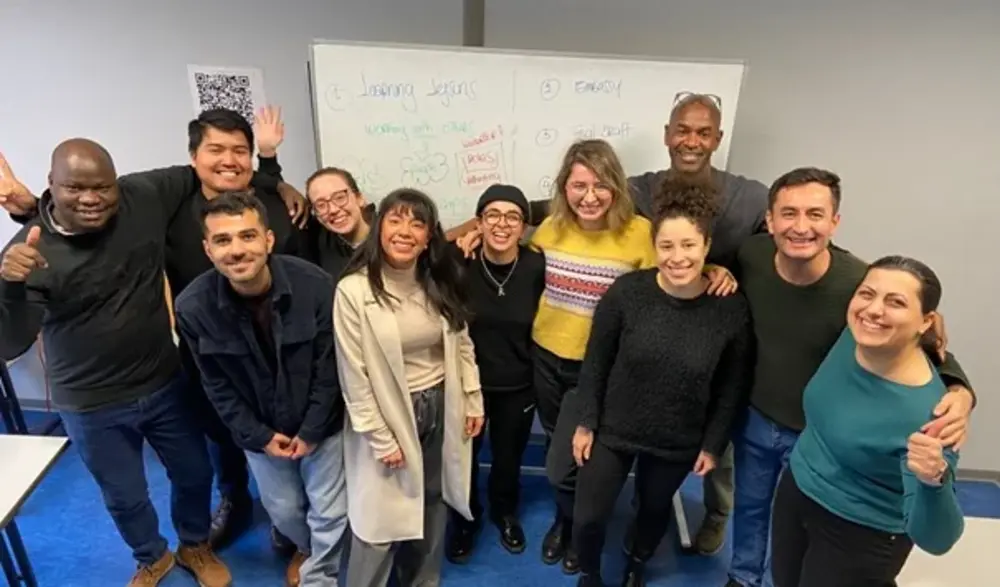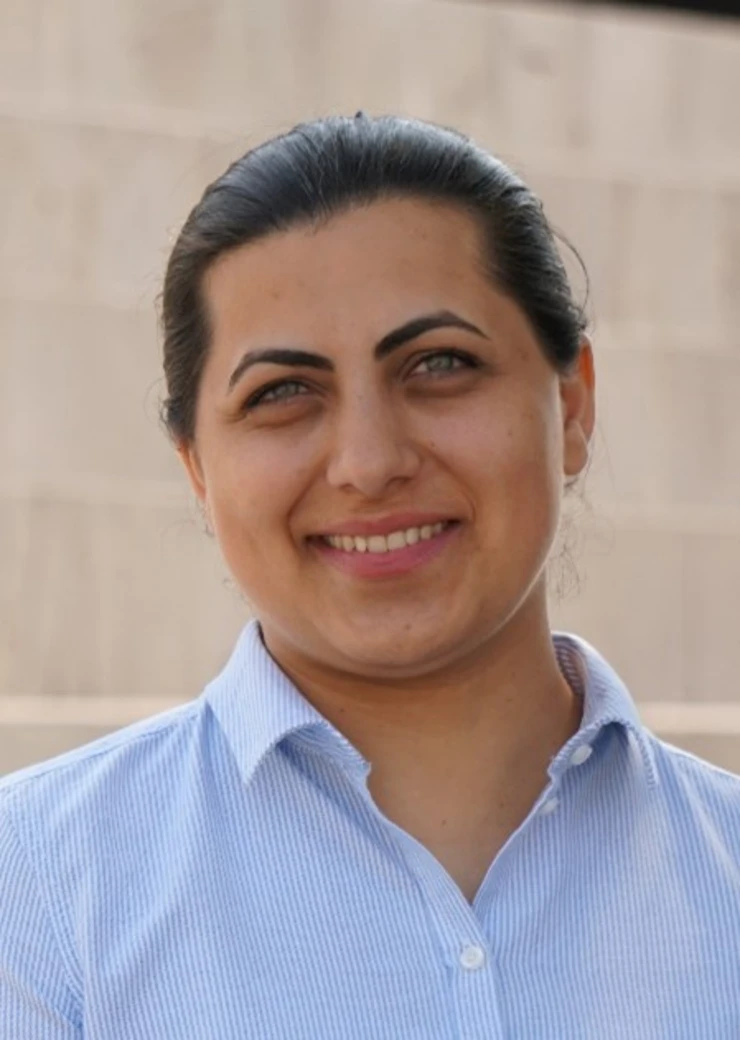Some reflections on the capstone project at the Willy Brandt School

During my third semester (2022-2023) and beyond, I was fortunate to be engaged in the capstone project entitled “Armed State Actors and Transitional Justice”, under the supervision of Dr. Alejandra Ortiz-Ayala, as a part of the practical training within the MPP curriculum. The capstone project was a collaboration between the German Colombian Peace Institute – CAPAZ and Willy Brandt School of Public Policy (WBS), which aimed to accompany and contribute to the new Government of Colombia in the security sector reform initiatives and their commitment with the fulfillment of the peace agreement. Our project group consisted of 11 WBS students coming from 10 countries, who both had experience in peacebuilding and peace research in their country contexts and were mostly specializing in peace and conflict studies at WBS.
The experience conducting this project was multifaceted and beneficial in several aspects and might have been different for the other 10 group members, however there are some features that will certainly be shared by many of the involved fellow classmates or other project group participants. From my perspective, the capstone project provided most of the elements one can encounter during the project implementation in real work circumstances. It included the possibility to test one’s capacities in the negotiations with the external partner, working in an inter-cultural group setting with diverse perspectives on the topic, necessity for group- and self-management, working in a flat hierarchy setting, tireless effort for grasping the thematic area and to be able to offer something new or from a new viewpoint.
Through this experience, I had the possibility to really contribute to the process and work on an issue I am professionally and personally very passionate about and have been engaged in my career so far. Most notably, the fact that the policy brief produced reached the quality to be published by our partner and to present to the policy stakeholders of Colombia in Germany, was an inspiring fact, who assured to further disseminate and communicate the paper within the Government of Colombia. As a peacebuilding practitioner and a person who has been working in civil society sector in my region, the interest and openness from the policymakers and decision makers for this research and publication is already an encouraging sign. It is especially important since in most of the cases in post-conflict or conflict situations, as well as for countries in transition, some policy areas and particularly the security sector, bear special restrictions and considerations when it comes to new policy development, as it usually holds very strong political implications and is immensely emotionally loaded on a societal level.
The capstone project besides its real-world implications and impact, was a truly intellectual endeavor and stimulation which one will seek in academia or other professional settings. Every session each week provided a chance for extensive and in-depth discussions around the peculiarities of the civil war and conflict in Colombia. Intensive brainstorming sessions, group discussions and the pertinent literature on the topic served as the building blocks for our policy brief. We particularly discussed the causes which lead to the distrust between the state institutions (security sector) and civilian population, the ways the security sector reform can be carried out, the relationships between the army and police and the ways to ensure the transition and improve perceptions of ‘the other’.
Understanding that we will not be able to encompass all the issues in the security sector, our group also in coordination with our partner, concentrated on the corruption that impedes the possible cooperation and distorts the trust-building efforts. However, the causal relationship between the corruption and trust was highly debatable within the group, each part having its convincing arguments. Eventually, although we concluded that the relationship is cyclical, we decided to focus on corruption serving as the main cause for the lack of trust towards state institutions. The brief provides policy recommendations for enhancing the social cohesion and trust between the civilians and security sector, the promotion of the democratic oversight in the security sector, as well as the civil society cooperation with the security sector both in terms of sharing their expertise and creating the possibilities for joint projects in the rural areas in Colombia where the relations between the society and army is more rigorous.
The capstone project provided a real-life experience working with an external partner. It was very crucial for the project to be able to effectively ‘translate’ the needs and the philosophy of the partner/project into actionable items, negotiate on the timeline and deliverables as a team, to come to terms with the process of writing and editing the policy brief as a group.
A crucial aspect of each project is the management or the distribution of responsibilities by the members. Our group experience might be very different from any other of the groups during the same year or in general, because either intentionally or occasionally, we did not choose any leader of the group and just shared the responsibilities for each stage. This might have been even more challenging and more time-consuming than in more hierarchical settings, however it also provided space for each group member to take on as much responsibility in certain points of the project that they deem possible and the most competent or available to complete. Eventually, I think it worked very well, and we had kind of ‘non-declared leaders’ or people who would push the project in each stage based on the qualities and competencies that would have fit best in those circumstances. Later, at the end of the project, during our group reflection on the project implementation process, I recalled the concept of “sliding general” that I had encountered in my previous professional experience. This concept implies that within a team or project, each member takes on various roles and assumes "temporary leadership" positions depending on the tasks and needs.
Finally, the project group improved intercultural competencies and communication skills including conflict resolution and problem solving. The project group around the topic of conflict, indeed could not have avoided working conflicts. Given the broad focus of the project, it was sometimes difficult to decide and orientate ourselves which way to think about the causes and effects, what will also be the most beneficial for the needs of the project, what could really impact the policy, and how to bring the real-life improvements to Colombia. Our discussions were sometimes intense and caused misunderstandings between the group members, however it provided the chance to employ our peacebuilding skills in working situations and we had enough capacity to individually or in group discuss, argue, and eventually solve all the issues and thematically come to an agreement to deliver our main message.
To conclude, I would emphasize that the capstone project with slight differences in each group serves a good platform and working setting to apply and challenge one’s interpersonal and intercultural competencies, formulate one’s messages with deep self-awareness and consideration of the group members, view certain topics from very different angles, work collaboratively in a very diverse team, act as a bridge between the partner and the team depending on the role, and gain project and group management skills irrespective of previous professional experience. As one of my mentors would say, “the end result is sacred”, and for me it was not just the policy brief but all the experiences, emotions and memories that will remain for life.
About the Author

Ani Tovmasyan is an MPP alumna (2021-2023) from the Willy Brandt School of Public Policy at the University of Erfurt, specializing in peace and conflict studies, and international development policy. Before her graduate studies, she worked in the civil society sector for over eight years in the South Caucasus region and Turkey, managing peacebuilding, conflict transformation and development programs at Eurasia Partnership Foundation in Armenia and Hrant Dink Foundation in Turkey. Her research interests include post-conflict reconstruction; third-party interventions and mediation; transitional justice and reconciliation; memory politics; environmental peacebuilding and climate security; democratization; humanitarian, and development assistance.
~ The views represented in this blog post do not necessarily represent those of the Brandt School. ~